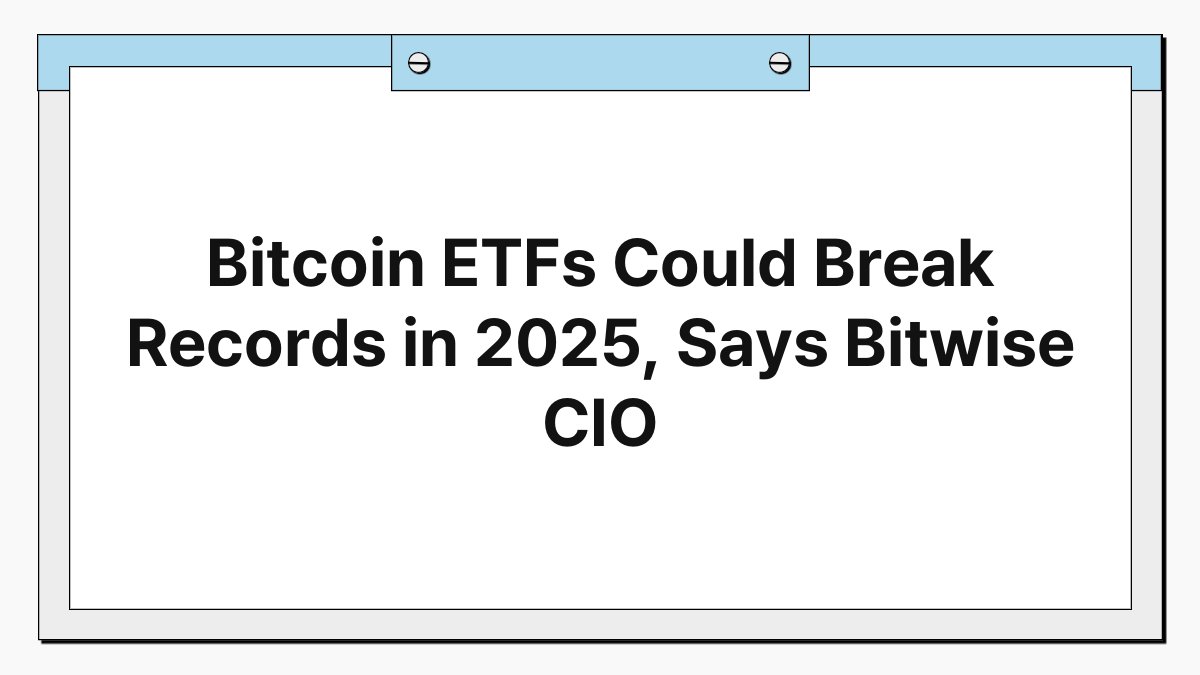[K-Bridge/Samuel] This article reflects growing optimism about the future of Bitcoin exchange-traded funds (ETFs).
The Chief Investment Officer of Bitwise predicts that the Bitcoin ETF market could deliver record-breaking performance in 2025.
This outlook suggests rising interest in Bitcoin and the broader cryptocurrency market, potentially opening new opportunities for investors.
Such projections may spark further discussion about how Bitcoin ETFs work and their broader impact on the financial markets.
Through this article, readers will learn about the concept of Bitcoin ETFs, market forecasts, and the potential implications for investors.
Understanding Bitcoin ETFs and Their Mechanism
What is a Bitcoin ETF?
A Bitcoin ETF is an exchange-traded fund that allows investors to buy shares representing the value of Bitcoin without directly owning the cryptocurrency.
This financial product provides an accessible way for traditional investors to gain exposure to Bitcoin’s price movements.
By purchasing shares of a Bitcoin ETF, investors can benefit from the potential price appreciation of Bitcoin while avoiding the complexities of managing a digital wallet or dealing with cryptocurrency exchanges.
This mechanism simplifies the investment process and attracts a broader audience who may be hesitant to navigate the crypto landscape.
How Do Bitcoin ETFs Operate?
Bitcoin ETFs typically operate by holding Bitcoin as an underlying asset and issuing shares that represent fractional ownership of that Bitcoin.
The price of the ETF shares fluctuates based on the market value of the Bitcoin held in the fund.
This structure allows investors to trade shares on traditional stock exchanges, providing liquidity and ease of access.
Moreover, the ETF structure is regulated, which adds a layer of security and transparency that many investors find appealing.
This operational model aims to bridge the gap between traditional finance and the burgeoning cryptocurrency market.
The Role of Custodians in Bitcoin ETFs
Custodians play a crucial role in the operation of Bitcoin ETFs by securely managing the underlying assets.
These financial institutions are responsible for storing the Bitcoin safely and ensuring its availability for the ETF.
The involvement of reputable custodians enhances investor confidence, as they provide assurance that the assets are protected against theft or loss.
Furthermore, custodians often implement advanced security measures, such as cold storage solutions, to safeguard the Bitcoin held in the ETF.
This custodial aspect is vital for maintaining the integrity and reliability of Bitcoin ETFs in the eyes of investors.
Market Trends Indicating Growth for Bitcoin ETFs
Increasing Institutional Interest
The growing interest from institutional investors is a significant trend indicating a potential surge in Bitcoin ETF adoption.
Large financial institutions are beginning to recognize the value of Bitcoin as a legitimate asset class, leading to increased allocations in their portfolios.
This institutional interest is a key driver for Bitcoin ETFs, as they provide a regulated and secure avenue for these investors to enter the cryptocurrency market.
As more institutions embrace Bitcoin, the demand for Bitcoin ETFs is likely to rise, contributing to record-breaking growth in the coming years.
Regulatory Developments Favoring Bitcoin ETFs
Recent regulatory developments have also paved the way for Bitcoin ETFs to gain traction.
Regulatory bodies are increasingly acknowledging the need for clearer guidelines surrounding cryptocurrency investments.
This shift towards a more structured regulatory environment is essential for the growth of Bitcoin ETFs, as it provides the necessary framework for their operation.
As regulations become more favorable, more ETF providers may seek to launch Bitcoin ETFs, further fueling market expansion and attracting a diverse range of investors.
Growing Retail Investor Participation
Retail investors are becoming increasingly involved in the cryptocurrency market, and Bitcoin ETFs offer a user-friendly way for them to participate.
As awareness of Bitcoin and its potential for high returns spreads, more individuals are looking for accessible investment options.
Bitcoin ETFs cater to this demand by allowing retail investors to invest in Bitcoin through familiar stock trading platforms.
This growing participation from retail investors is expected to contribute to increased trading volumes and liquidity in Bitcoin ETFs, further supporting their growth trajectory.
Potential Challenges Facing Bitcoin ETFs
Market Volatility
One of the primary challenges facing Bitcoin ETFs is the inherent volatility of the cryptocurrency market.
Bitcoin prices can experience significant fluctuations within short periods, which may deter some investors from entering the market.
This volatility can impact the performance of Bitcoin ETFs, leading to potential losses for investors.
While the ETF structure provides a regulated investment vehicle, the underlying asset’s price volatility remains a critical concern that investors must consider when investing in Bitcoin ETFs.
Regulatory Uncertainty
Despite recent positive developments, regulatory uncertainty continues to pose challenges for Bitcoin ETFs.
The cryptocurrency landscape is still evolving, and regulatory bodies may introduce new rules that affect how Bitcoin ETFs operate.
This uncertainty can create apprehension among potential investors, as they may fear sudden regulatory changes could impact their investments.
Clarity and consistency in regulations are essential for building investor confidence and ensuring the long-term success of Bitcoin ETFs.
Competition from Other Investment Vehicles
As the cryptocurrency market matures, Bitcoin ETFs may face competition from other investment vehicles, such as cryptocurrency mutual funds and decentralized finance (DeFi) products.
These alternatives may offer unique advantages, such as lower fees or innovative investment strategies.
As investors explore various options for gaining exposure to Bitcoin, ETF providers must differentiate their products to remain competitive in the evolving landscape.
This competition could influence the growth trajectory of Bitcoin ETFs in the coming years.
The Future of Bitcoin ETFs in 2025
Predictions from Industry Experts
Industry experts predict that Bitcoin ETFs could break records in 2025, driven by a combination of factors.
Increased institutional adoption, favorable regulatory developments, and growing retail participation are all expected to contribute to this anticipated growth.
As more investors seek to capitalize on Bitcoin’s potential, the demand for Bitcoin ETFs is likely to surge, leading to unprecedented trading volumes and asset inflows.
This optimistic outlook reflects a broader acceptance of Bitcoin as a legitimate investment asset, paving the way for a thriving ETF market.
Technological Advancements Supporting Growth
Technological advancements are also expected to play a crucial role in the future success of Bitcoin ETFs.
Innovations in blockchain technology and improvements in trading infrastructure can enhance the efficiency and security of Bitcoin ETFs.
These advancements may attract more investors by addressing some of the concerns associated with cryptocurrency investments, such as security and ease of trading.
As technology continues to evolve, Bitcoin ETFs may become even more appealing to a wider range of investors.
The Role of Education in Investor Adoption
Education will be a vital component in driving the growth of Bitcoin ETFs.
As investors become more informed about the benefits and risks associated with Bitcoin, they will be better equipped to make investment decisions.
Educational initiatives aimed at demystifying Bitcoin and ETFs can help bridge the knowledge gap and encourage more individuals to explore these investment options.
By fostering a better understanding of Bitcoin ETFs, the industry can facilitate greater adoption and participation in the market.
Investment Strategies for Bitcoin ETFs
Long-Term Holding vs.
Active Trading
Investors considering Bitcoin ETFs must decide between long-term holding and active trading strategies.
Long-term holding involves purchasing shares and retaining them for an extended period, capitalizing on Bitcoin’s potential price appreciation over time.
This strategy may suit investors who believe in Bitcoin’s long-term value and are willing to ride out market volatility.
On the other hand, active trading requires monitoring market trends and executing trades based on short-term price movements.
This approach may appeal to more experienced investors looking to capitalize on the inherent volatility of Bitcoin.
Diversification within Bitcoin ETFs
Diversification is another essential strategy for investors in Bitcoin ETFs.
While Bitcoin is the primary asset in these ETFs, some funds may also include exposure to other cryptocurrencies or blockchain-related assets.
By diversifying their investments, investors can mitigate risk and potentially enhance returns.
This strategy allows investors to benefit from the broader cryptocurrency market while still maintaining a core investment in Bitcoin.
Dollar-Cost Averaging Approach
Implementing a dollar-cost averaging approach can also be beneficial for investors in Bitcoin ETFs.
This strategy involves investing a fixed amount of money at regular intervals, regardless of the asset’s price.
By consistently investing over time, investors can reduce the impact of market volatility and potentially lower their average purchase price.
This disciplined approach can help investors navigate the ups and downs of the cryptocurrency market while building a position in Bitcoin ETFs.
Conclusion: The Bright Future of Bitcoin ETFs
The outlook for Bitcoin ETFs is promising, with predictions of record-breaking growth by 2025. As institutional interest rises, regulatory developments become more favorable, and retail participation increases, the demand for Bitcoin ETFs is set to soar.
While challenges such as market volatility and regulatory uncertainty remain, the potential benefits of investing in Bitcoin ETFs are significant.
By understanding the mechanisms, market trends, and investment strategies associated with Bitcoin ETFs, investors can position themselves to capitalize on this evolving market.
As the cryptocurrency landscape continues to evolve, Bitcoin ETFs are poised to play a pivotal role in shaping the future of digital asset investments.








